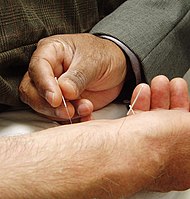
Photo from wikipedia
Background While evidence is accumulating to propose a specific contribution of sleep disorders and low quality sleep in the pathogenesis of temporomandibular disorders (TMD), management of primary sleep disorders in… Click to show full abstract
Background While evidence is accumulating to propose a specific contribution of sleep disorders and low quality sleep in the pathogenesis of temporomandibular disorders (TMD), management of primary sleep disorders in the process of preventing and treating TMD still remains scientifically unsupported. Objective To investigate the association of primary sleep disorders with TMD risk in South Korea. Patients and Methods This study was based on the National Health Insurance Service-National Health Screening Cohort (NHIS-HEALS) of South Korea with 468,882 participants. After excluding participants diagnosed in 2002, those with a diagnosis of a primary sleep disorder in 2003–2005 were recruited. All participants diagnosed with TMD between January 1, 2006 and December 31, 2013 received follow-up. Cox proportional hazards regression was performed to determine the adjusted hazard ratios (aHR) and 95% confidence interval (CI) for TMD according to the presence or absence of a primary sleep disorder diagnosis. Results After adjusting for all covariates, primary sleep disorder patients had a 44% higher risk for TMD compared with non-sleep disorder participants (aHR 1.44, 95% CI 1.02–2.04). The incidence rate of TMD was nearly twice as high in participants with sleep disorders compared with those without (6.08 vs 3.27, per 104 person-years). In subgroup analysis, an association was observed with those over 60 years old or who frequently exercised physically. Conclusion Primary sleep disorders could be an important independent risk factor for the initiation and maintenance of TMD. Patients with sleep disorders should be monitored for possible co-occurrence of TMD-related symptoms that could aggravate sleep disorders in turn.
Journal Title: International Journal of General Medicine
Year Published: 2021
Link to full text (if available)
Share on Social Media: Sign Up to like & get
recommendations!